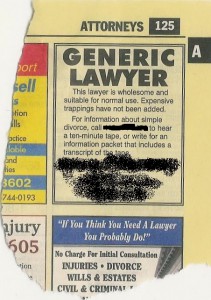A Victory For Free Speech and Hilariously Bad Lawyer Advertisements
We’ve all seen some pretty terrible advertisements for lawyers and law firms, some of them amusingly so. Of course, it’s easy for members of the public to have a laugh at the expense of some solo practitioner or small firm who just couldn’t afford to hire an advertising agency. However, many lawyers are divided over the merits of some of the tackiest examples of this phenomenon. Some lawyers see them as an embarrassment to the profession.
The 2nd Circuit Court of Appeals recently found some of New York’s rules concerning attorney advertising (which are tightly regulated in most states) to be unconstitutional as a violation of the First Amendment right to free speech. Here is the full opinion (.pdf).
Now, courts routinely allow for more leeway with respect to the regulation of commercial speech than other types of speech, and even more when it comes to regulating advertisements by professionals such as lawyers. So, these rules must have been pretty egregious if they were found unconstitutional.
Indeed, the rules did ban just anything that might make an advertisement remotely interesting to look at, thereby getting the viewer’s attention (you know, the whole point of advertising). Essentially, the ads would be limited to the lawyer saying something like “My name is John Q. Lawyer. This is my law firm. It is located here. I practice such and such areas of law. The end.”
The law banned most dramatizations, portrayals of fictional law firms, and depictions of judges in the advertisements. Lawyers were banned from “exhibiting characteristics clearly irrelevant to legal competence.”
Under such a rule, it’s arguable that attorneys wouldn’t even be able to put photographs of themselves on their websites or in their commercials, since a photograph of a lawyer doesn’t tell the consumer anything about his or her legal competence.
Furthermore, the advertisements prohibited most forms of client testimonials. Now, I’ll admit that this is a tricky area. We’ve all seen those commercials where a person in a foam neck brace says something like “John Q. Lawyer got me five hundred thousand dollars!”
These testimonials have to be handled very, very carefully. The lawyer has to be extremely careful not to imply that anything other than the merits of the client’s case got a particular result. After all, in the legal system, that’s all that’s supposed to matter (of course, we all know that, for better or worse, an extremely skilled lawyer can increase a person’s chances of winning a meritless case, but it’s fun to pretend).
 Another interesting rule that was involved in this case was intended to prevent virtual “ambulance chasing.” Ambulance chasing, as you probably know, is a pejorative term used to describe lawyers who solicit directly to prospective clients immediately after they’re injured, or arrested, or whatever. Direct solicitation to individual clients, especially those who are injured or bereaved, is extremely distasteful, and can give the legal profession at large a bad name. For that reason, direct solicitation to individual clients is not allowed in most states.
Another interesting rule that was involved in this case was intended to prevent virtual “ambulance chasing.” Ambulance chasing, as you probably know, is a pejorative term used to describe lawyers who solicit directly to prospective clients immediately after they’re injured, or arrested, or whatever. Direct solicitation to individual clients, especially those who are injured or bereaved, is extremely distasteful, and can give the legal profession at large a bad name. For that reason, direct solicitation to individual clients is not allowed in most states.
But the New York rules attempted to address a relatively new problem: targeted Internet and television advertisements that refer to a specific accident, and attempt to solicit people who were injured in it as clients. For example, suppose a small plane crashes into a densely populated neighborhood, causing several injuries. A savvy lawyer sees the news coverage, and calls up an ad agency, and tells them that he wants an advertisement addressing that specific incident. He could have the TV commercials run during the local nightly news, which is likely to be talking about the accident. He could also buy advertising space on websites, with purchased keywords making it likely to show up next to news stories talking about the accident, and he does all of this with the intent that at least some of the accident victims or their family members will see the advertisements, and call him up.
Is this solicitation? The state of New York thought so, and prohibited such advertisements for a 30-day period after the accident occurred. The 2nd Circuit upheld this prohibition.
The court also upheld a provision that prohibited lawyers from making false or misleading statements in their advertisements, which was not very controversial to begin with.
All in all, this seems like a pretty good decision: it protects the First Amendment rights of lawyers (yes, even lawyers have a right to free speech) with respect to advertising, but leaves states enough leeway to regulate lawyer advertising to curb some of the worst practices (direct solicitation, false advertising, etc.).
Of course, because of this, states will likely not be able to regulate the tone or style of lawyer advertisements. From a free speech perspective, this is certainly a good thing. However, it still seems that lawyers who choose to advertise should give some thought to the dignity and prestige of the profession that they worked so hard to get into.

Comments